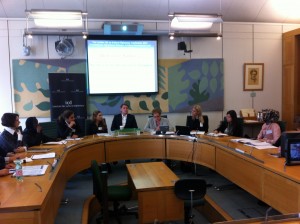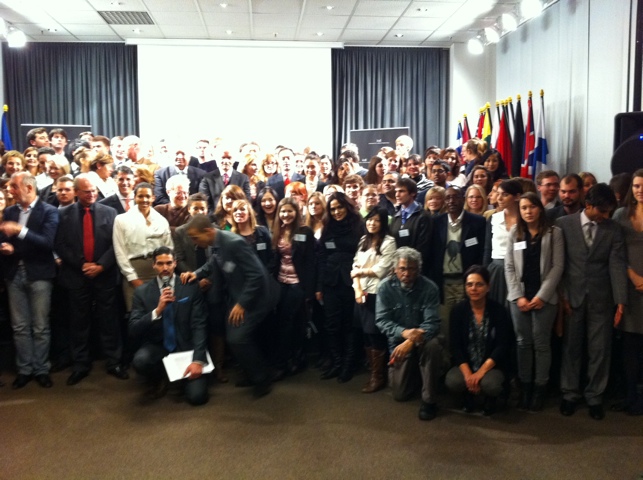 Intercultural Diplomacy, eine Bewegung die mittlerweile weltweite Kontakte hat und Hoffnungsträger der Gesellschaft von morgen zusammenbringt. In London trafen sich 30 Teilnehmer aus der ganzen Welt, von Australien, Südkorea, Qatar bis Wien und Tchechei. Debattiert wurde über Themen wie Kultur verändern könnte was in den zwischenmenschlichen Beziehungen nicht klappt. Respekt vor dem andern, vor seiner Kultur, vor seiner Sprache, das wäre die grundsätzliche Basis einer friedlichen Welt.
Intercultural Diplomacy, eine Bewegung die mittlerweile weltweite Kontakte hat und Hoffnungsträger der Gesellschaft von morgen zusammenbringt. In London trafen sich 30 Teilnehmer aus der ganzen Welt, von Australien, Südkorea, Qatar bis Wien und Tchechei. Debattiert wurde über Themen wie Kultur verändern könnte was in den zwischenmenschlichen Beziehungen nicht klappt. Respekt vor dem andern, vor seiner Kultur, vor seiner Sprache, das wäre die grundsätzliche Basis einer friedlichen Welt. Lire plus…
Lire plus…
Cultural Diplomacy
ICD Berlin 17.Februar
I congratulate Mark Donfried to put culture on the agenda.
Right at this moment we must be aware that people need perspectives which make life worth living, in spite of material break downs and misfortune. Our struggle to pass through a period with serious difficulties should be the opportunity to look at what is really important, what makes the difference in life. Lire plus…
Cultural Diplomacy
Some weeks ago the FT titled: National angst in the dying days of uniculturalism. In his article Tony Barber related to David Cameron’s speech on the failure of multiculturalism, he mentioned the speech of Chancellor Merckel denouncing Multikulti, he could have mentioned as well Mr. Sarkozy’s initiative on the French identity and many others questioning who they are. The Turkish Prime Minister on his visit to Germany in 2011 said assimilation was contrary to the respects of fundamental human rights. This caused a general tollé in Germany. We are in a basic debate on roots and leaves. The question is not only who we are, but also where we come from. This is a crucial debate for politicians, but politics as it is understood now, cannot resolve this problem by regulation and legislation.
ICD Conference The language of Arts and Music/ Berlin 17th to 20th February
The Importance of Cultural Diplomacy
Whether the emerging European Dream can offer an alternative vision more able to accommodate the tumultuous changes occurring in the world today, from globalization of the economy and rising unemployment to the spread of religious terrorism, remains to be seen…These are tumultuous times. Much of the world is going dark, leaving many human beings without clear directions. The European Dream is a beacon of light in a troubled world. It beckons us to a new age of inclusivity, diversity, quality of life, deep play, sustainability, universal human rights, the rights of nature, and peace on Earth. We Americans used to say that the American Dream is worth dying for. The new European Dream is worth living for.These statements by Jeremy Rifkin in 2004 in his book the European Dream should strengthen our leaders to cross barriers, build bridges, try with intercultural dialogue, promote arts and music, non verbal expression, feelings, emotions, live with our hearts, not only with our brains.
The first decade of the 21first century has brought a lot of changes in the world. In these first months of 2011, people’s fight for freedom exploded in many regions. Networks helped these, hopefully peaceful, revolutions to happen. Oppression is no longer tolerated; a new area started with the worldwide information and communication technologies. Therefore a new way of governance has to come. With respect of the cultures and beliefs of each human being, democracy has to prove it’s real value.
Cultural Diplomacy can help to promote a new thinking, based on the knowledge of each other, to gather people from different cultures and generations, professional backgrounds and civilizations, to meet, not only in the virtual world of the « Net », but as real persons with their individual aura.
Cultural Diplomacy should help us to be ahead of the changes, to anticipate upcoming conflicts, in order to better prepare the right solutions. This should however not remain the dream of some privileged participants, but help to initiate future leaders in a changing world.
Culture and its diversity are tools for a new way of political action, promoting contacts between generations, nations and continents.The language of arts and music may succeed, where words and figures failed.Culture can make the difference, by telling us which proposals should be set into force to reconcile people with themselves, to build peace when the economy failed, the finances broke down, the political structures are to be questioned.
The goal intercultural diplomacy aims at, is to make aware of the power of music, to connect musicians and executives, artists and managers, to think about how the change can happen.
Culture should make the difference, establish the link from one person to the other. All together we should aim at making of the diversity the wealth, of the well being of people the achievement and the success of our society.


